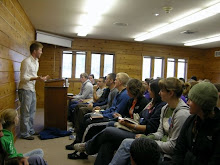People who value their Bible as the Word of God enjoy it when a pastor says something along the lines of, "The Greek word is ___ and it means THIS!" In earlier sermons of mine, I too have cued the crowd into deeper meanings from the Biblical languages. After actually learning Greek (it is quasi-comical to think of me trying to use the languages when I barely had an elementary understanding of their usage), the number one thing I learned was how absolutely phenomenal our English translations are (and by this I mean the NASB, ESV, NIV, TNIV, NLT, etc). As I began to translate 1 John and the Lord's prayer in Matthew 6 from Koine Greek into English, I was blown away at how incredibly accurate the English translation is. Then I thought, why should this surprise me? People much smarter than I, with greater resources than I, have interacted with the text to bring about the translation. This brings me back to my point about using the Greek in sermons. What happens when a preacher brings up the original language? A wall is immediately constructed between the reader and the text. What is essentially being communicated is, "Your Bible doesn't tell you this, but I will tell you what is really being communicated." Instead, our pastors (shepherds) should, if they truly know the original language, communicate how radically accurate the English translation is, thus giving confidence to the reader for understanding God's revelation in His Word. Instead of constructing a wall, let's unleash radical confidence into the mind of the reader so that they may truly believe, "Yes, this IS what God desired to communicate and yes, this IS what the text truly means." Maybe then we can recapture a heart of submission to God's Word as truly accurate and authoritative for every aspect of the life of the believer. This is my heart and this is my prayer.
(Many of these thoughts were spurred on by lectures from Dana Harris, professor of NT at Trinity.)

well said david. ronaldo and i (kel) totally agree with this. it's exciting to learn...and it's exciting to know that in the future you will be a pastor who is not putting up walls but who is building bridges for people to love and know God's Word!
ReplyDelete